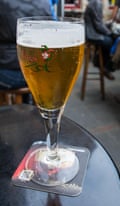While the beer is famously good in Belgium, for some tourists it would seem the drink itself is not enough. Bars and cafes in the country’s most picturesque cities complain that tens of thousands of their stylish glasses are being lost to souvenir hunters every year. But the purveyors of Belgium’s most famous cultural artefact are fighting back, in some unorthodox ways.

In Bruges, Philip Maes, the landlord at the Bruges Beerwall cafe, overlooking the city’s central Groenerei canal, has invested in security alarms which are attached to the stem of each of his glasses. “We have lost at least 4,000 [glasses] every year,” Maes said. “Especially the tourists liked to walk with them. For some reason, some customers think that when they pay for something to drink, they get the glass as a present.”
Maes added: “Such an alarm system does indeed cost €4,000. But we already had a large part of it because we have a beer store. There was already a scanner at the exit and the cafe is a part of the business.”
Further to the east of the country, in Ghent, the Dulle Griet, a bar offering 500 different types of beer, has gone one step further to guarantee the safety of its most prized glasses. “Anyone who drinks our house beer must hand over his shoe,” Alex Devriendt told the Belgian daily newspaper the Nieuwsblad. “We then put them in a basket that we pull up against the ceiling. The basket has now become an attraction, but for us it remains a guarantee. [The glasses] are quite expensive because we have them made especially.”
Devriendt added: “We have to supplement our inventory every day. Tourists simply want a souvenir. Some even try to throw those old-fashioned billboards off my wall. Certainly in the winter a lot disappears, they have thick coats on. In the summer they can hide the loot less well.”
Belgian beer glasses come in an array of different shapes and sizes, from goblets and chalices to flutes and so-called tulips, designed for beers that taste best when they have a voluminous foam head.
It is claimed that a favourite for the tourists in Bruges are the glasses bearing the insignia of the Brugse Zot, the city’s only central brewery.
The family-run company provides them to the bars for free as a way to market its product, but it admits that this comes at a hefty price. “Every month we have to deliver a thousand new ones here in Bruges,” said Jan Paillaert. “Glasses are a necessary evil for brewers. They are our business card, so you want every cafe to have them all the time. But it costs you money when people start walking with it. Hotel bars are even worse than cafes. A lot more disappear there.”
